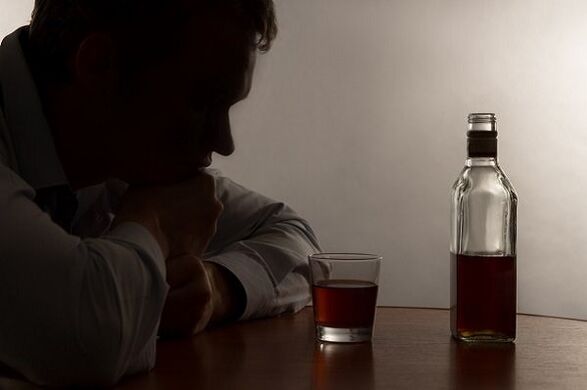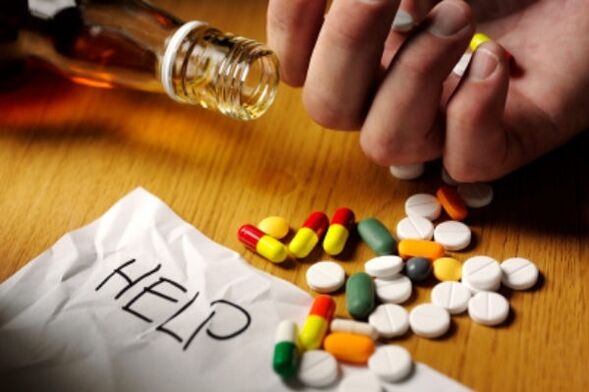People and their relatives believe that it is much better and more correct to stop drinking abruptly than to give up the bad habit step by step. Such a method does not work equally effectively for everyone, and then people wonder how to gradually stop drinking, which will cause minimal harm to health.
Is it possible to stop drinking suddenly?
After the drunks decide to abruptly give up alcohol, they often fail and return to their addiction again. In addition, the dependence on alcohol becomes more and more severe as, after suddenly stopping receiving the usual ethanol, the body tries to save it for future use.
People who have been drinking for a long time get so used to the effects of alcohol on the body that a sharp rejection not only creates unpleasant sensations, but also binds them even more to the bottle if they break off. Often times, such attempts to part with addiction often affect and exacerbate the physical and mental state of a person's health. However, alcoholism is not a desire to drink, but an addiction that forms on several levels and the sudden abandonment of which has catastrophic consequences.
Important!It is possible to stop alcohol abruptly if the addiction lasts less than a year.

People with long-term alcoholism will not be able to give up the "green line" once and for all. Their throwing should be gradual and ideally under the supervision of a narcologist. This is due to the fact that with a sharp rejection of the habit, chronic diseases can worsen, and mental problems develop that did not previously exist. Preventing negative rejection from becoming a reason to return to alcohol requires doctor control, support from relatives and friends, and the use of a gradual rejection technique rather than a sharp separation from an addiction. Tools that are freely sold on the Internet also help here.
What changes will occur in the body
After the first abstinence from alcohol, feelings in a person can be subjectively uncomfortable. This is due to the negative effect of ethanol on the body, as well as the fact that the drunk has not yet restored his health.

In the first few weeks from the moment of rejection, a person may break down, get sick frequently, and experience bouts of depression. Such a reaction is explained by a decrease in immunity and the fact that the body has not yet adapted to new conditions and tries to return everything to its usual course. People at this time tend to grab the bottle again, convinced that this is better than being sick all the time.
Important!First of all, there should be people next to the former alcoholic who can give him psychological support and explain that health will return to normal as soon as the body is completely rid of toxins.
When the crisis is over and the body recovers, the former drunk will feel much better and even notice it. Improvements will show up in:
- Increase in the body's defenses;
- Improvement of skin condition;
- Improve memory;
- Stability in the work of the heart and blood vessels;
- Normalization of digestive and urination processes.
Alcoholics do not experience immediate improvement in their general condition once they stop drinking. It takes time for the body to cope with the addiction. You need to remember this and not expect any quick results.
Alcohol withdrawal syndrome
Drunk people often refer to their fear of withdrawal from alcohol when defending their desire to drink. What is it and how to stop drinking alcohol so that these nasty kind of complications do not develop?
Withdrawal is the human body's normal response to a sudden rejection of something. In the case of alcoholism, it manifests itself mainly in such a dangerous condition as delirium tremens.

Delirium tremens is expressed when a person loses control of himself a few days after refusing to drink anything. In this case, you may experience the following symptoms:
- Insomnia;
- Panic attacks;
- Hallucinations;
- Rave.
In a state of such psychosis, a former alcoholic poses serious danger, not only to himself but also to those around him. Symptoms mainly develop in the evening and morning, while the person is calm during the day and night.
It has been proven that alcoholic psychosis mainly develops in people who drink alcohol, have been drinking alcohol for a long time, and give up abruptly.
With the gradual abandonment of regularly consumed harmful products, the withdrawal syndrome very rarely develops. This is another reason for the gradual attachment to the "green snake".
Gradual failure is the key to success
If you have been drinking for a long time and cannot imagine without a bottle of beer or a glass of vodka, doctors recommend contacting a professional. The narcologist, to whom such a patient comes and who finds that he has a problem, will give recommendations on how to gradually refuse alcohol.
Gradually stopping drinking is the best option for chronic drinkers. At the same time, it becomes possible to combine different treatment methods for addiction, ranging from drugs to psychotherapy sessions.
Gradual failure consists of several stages.
- First, a person must accept the existence of a problem and be ready to deal with it. This stage is one of the most difficult as alcoholics often feel sick with nothing.
- Second, you need to overcome your pride and seek medical help. This phase can also be difficult for addicts as they have to admit that they have weaknesses to deal with.
- Third, it will be necessary to begin a consistent and gradual struggle. To do this, you need to follow the doctor's recommendations, avoid drinking companies and radically change your attitude towards life.

As a person gradually stops drinking, they are much more likely to come to terms with their addiction once and for all. In this case, the body manages to adapt to changes, get rid of accumulated toxins and develop new positive habits to replace negative old ones.
Gradual refusal to drink alcohol is an option for people whose addiction has already moved to a chronic stage where it is impossible to stop drinking abruptly. Such a method of breaking up with an addiction requires medical advice, a positive attitude and perseverance, and the support of loved ones. The more responsible a person is about the need to stop drinking, the higher the chance of success.

































